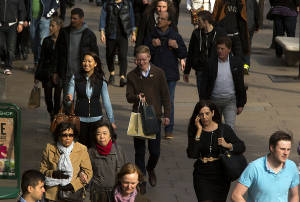 e than three times as much as economists forecast in February as Internet sales and spending on food surged, signaling the recovery maintained its momentum in the first quarter.
e than three times as much as economists forecast in February as Internet sales and spending on food surged, signaling the recovery maintained its momentum in the first quarter. Sales including auto fuel increased 1.7% from January, when they declined a revised 2%, the Office for National Statistics said today in London. That compared with a forecast for an increase of 0.5%, according to the median of 20 economists in a Bloomberg News survey.
Consumers buoyed by a surging housing market and rising employment are continuing to drive Britain’s recovery, with the Bank of England forecasting last month that household-spending growth will accelerate to more than 3% this year.
“Consumers are still loosening their purse strings,” said Samuel Tombs, an economist at Capital Economics Ltd. in London. The figures provide “some reassurance that the economic recovery has not lost pace in the first quarter.”
The pound appreciated after the data, rising 0.2% to $1.6622 at 10:08 a.m. London time, and advancing 0.5% to 82.70 pence per euro. The 10-year gilt yield was little changed at 2.69%.
Food sales rose 2.1% from January, contributing about half the overall monthly increase in retail sales, the ONS said. Sales of auto fuel increased 0.9%, the data showed. There was also a 7.9% jump in sales via the Internet and mail order, which contributed a quarter of the overall monthly increase.
Heavy Rain
Clothing sales slipped 0.1% and spending on household goods dropped 1.1%. Sales at so-called other stores, which include pharmacies, rose 2.9%.
The ONS said the wettest winter for almost 250 years had no material impact on retail sales. Rainfall in some parts of the country in February was almost 2 1/2 times the monthly average.
From a year earlier, total retail sales rose 3.7%. The average price of good sold fell 0.2%, the first annual decline since September 2009. The fall was driven by discounting of auto-fuel prices, which dropped 4.4%, today’s figures showed.
In the three months through February, spending was up 1.6% from the previous three months, the most since August.
Excluding motor fuel, sales increased 1.8% on the month and were up 4.2% from a year earlier.
The Office for Budget Responsibility, Britain’s fiscal watchdog, estimates average earnings will outpace inflation this year, ending a 5 1/2-year squeeze that has pushed living standards to the lowest in a decade.
It warned, though, that spending is being powered by consumers saving less of their income at a rate that is unsustainable, while borrowing to fund home purchases risks increasing household indebtedness to levels last seen before the financial crisis.





